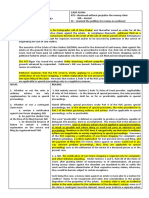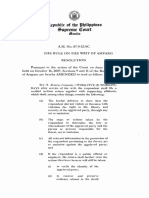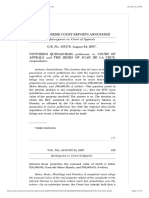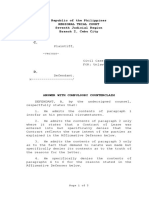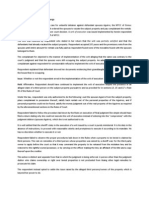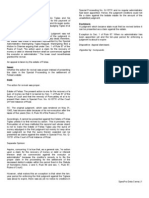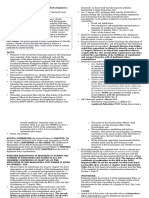0 ratings0% found this document useful (0 votes)
444 viewsCases Civ PRO Digest
The court ruled that the heirs who filed a motion to intervene in a case regarding a promissory note did not have a direct legal interest and therefore their motion was correctly denied. The court examined several other cases and found that in one case the dismissal of an earlier case regarding unpaid installments did not preclude a second case on different unpaid installments. In another case, the court found error in dismissing a complaint without allowing the plaintiff to amend.
Uploaded by
Paolo BargoCopyright
© © All Rights Reserved
Available Formats
Download as DOCX, PDF, TXT or read online on Scribd
0 ratings0% found this document useful (0 votes)
444 viewsCases Civ PRO Digest
The court ruled that the heirs who filed a motion to intervene in a case regarding a promissory note did not have a direct legal interest and therefore their motion was correctly denied. The court examined several other cases and found that in one case the dismissal of an earlier case regarding unpaid installments did not preclude a second case on different unpaid installments. In another case, the court found error in dismissing a complaint without allowing the plaintiff to amend.
Uploaded by
Paolo BargoCopyright
© © All Rights Reserved
Available Formats
Download as DOCX, PDF, TXT or read online on Scribd
You are on page 1/ 10
G.R. No.
45454 April 12, 1939
Garcia vs. David
Facts:
On April 1, 1936, Mercedes Caldera de Sabino commenced in the Court of First Instance of
Camarines Sur a personal action (civil case No. 6277) against Candida Espinosa for the
recovery of the value of a certain promissory note which was signed and delivered by one
Isaac Villamora in behalf of the defendant. The defendant entered a general denial on April
18, 1936, alleging as special defenses that she did not authorize Isaac Villamora to sign for
her and that the instrument sued upon was fraudulent.
Subsequently, on July 22, 1936, the respondents, Sinforosa David, Marciana C. Villamora,
Encarnacion Enojado, Crisanto Castro and Afredo Castro filed a motion praying that they be
allowed to intervene because "they are the children and only heirs of the deceased Mariano
Castro, husband of the defendant, and that on the date of the execution of the note,
defendant was already legally married to said Mariano Castro." The plaintiff filed an
objection to the motion for intervention on the ground that the respondents are neither
proper nor necessary parties, for do they have any legal interest in the subject matter of
the litigation. on August 6, 1936, after hearing, the court denied the motion to intervene. A
motion for reconsideration was filed but was denied.
Issue:
W/N parties who filed a motion to intervene as persons with interest
Ruling:
It is apparent that the heirs have no legal interest against both parties, plaintiff and
defendant. Neither, in the success of either of them for as a matter of fact, they desire to
frustrate the present claim on the promissory note, without necessarily implying their
approbation of the defendants stand. Consequently, if they could be allowed to intervene, it
must be on the ground that they have a legal interest in the subject matter of the litigation.
It is claimed that the respondents have an interest in the property of the spouses in so far
as they are the heirs of the deceased husband, from which they take the inference that
"said heirs have likewise an interest in the subject matter of the litigation." (Page 15 of
Printed Record.) But this is not sufficient legal interest under section 121 of the Code of Civil
Procedure. What is contemplated is an interest which is actual and material, direct and
immediate, and not simply contingent or expectant. So it has been held "that the interest
which entitles a person to intervene in a suit between other parties must be in the matter in
litigation and of such direct and immediate character that the intervenor will either gain or
lose by the direct legal operation and effect of the judgment.
G.R. No. 63326
Filinvest vs. Salas
Facts:
In January, 1981, Nicario Avisado bought a Colt Lancer from Wheels Distributors, Inc.
payable on monthly installments. The obligation was evidenced by a promissory note
secured by a chattel mortgage on the car. The promissory note carries a stipulation on
acceleration of maturity for the entire obligation in the event of default in the payment of
any installment. Later, the obligation together with the supporting security was transferred
by Wheels Distributors, Inc. to Filinvest Credit Corporation (Filinvest) with the consent of
Avisado.
For failure of Avisado to pay the installments due on May 1 through October 1, 1981,
Filinvest filed on October 12, 1981 against him a replevin/collection suit (Civil Case No. F-
21040). But this case was dismissed with prejudice at the instance of Filinvest after the
defendant had agreed to update his installment payments.
Later, however, Avisado again defaulted in the payment of subsequent installments, this
time, those due on December 1, 1981 and the four succeeding months, which impelled
Filinvest to file another replevin/collection suit against Avisado (Civil Case No. R-21996).
After commencement of the action, a writ of replevin was issued against a bond duly
posted, by virtue ' of which the- car was seized by the sheriff and turned over to Filinvest.
Once in possession of the car, Filinvest extrajudicially foreclosed the chattel mortgage
thereon. At the foreclosure sale, the car was sold to Filinvest for an amount equal to its
claim against the mortgagor. Later, Filinvest resold the car to Warsito Capangpangan.
However, upon motion of Avisado, the trial court issued an Order dated September 21,
1982 dismissing the complainant on the ground of res judicata
Issue:
W/N the court erred in dismissing the case on the ground of res judicata
Ruling:
We hold that the court a quo erred in dismissing C.C. R21996. Since the first case instituted
by Filinvest against Avisado (C.C. R-21040) was for non-payment of installments different
from those on which the second suit (C.C. R-21996) was based, the dismissal of the former
with prejudice would not bar the filing of the latter, nor serve as basis for its dismissal. The
causes of action being different, there could be no res judicata.
G.R. No. 18574
Macapinlac vs Repide
Facts:
The case was instituted for the purpose of declaring plaintiff as owner of a real estate property and to
nullify the Torrens title, which was in respondents name. Plaintiff also wanted to recover possession
over the property with damages. Plaintiff owned the real estate property located in Pampanga. Later,
plaintiff acquired a loan to Bachrach Garage & Taxicab for a price of an automobile. To secure payment,
plaintiff executed fourteenpromissory notes: 11 in the hands of Bachrach and 3 in the hands of the
payee of the company. As security and guaranty of payment, plaintiff executed a deed of sale with a
right to repurchase. More than a year later, respondent acquired the rights of Bachrach over the
properties by payingP5000. Be it noted that during the conveyance of rights, Repide knew of the
purpose of the transfer of title to secure the debt owing to Bachrach by the plaintiff. He also knew that
the debt had been paid andthat only a half of the debt existed. Afterwards, Repide caused for the
transfer of title into his name by making it appear that the purported sale was true. During those times,
respondent Repide was in actual possession of the property and was enjoying its fruits. Plaintiff filed a
case to recover possession in which the Court of First Instance decided in favor of respondent. Due to
this, plaintiff filed for a review of the case
Issue:
W/N the court erred in admitting the demurer whilst dismissing the complaint
Ruling:
As to the extent of the review which may be had at the instance of the appellant in this
court, it should be noted that by the express terms of section 143 of the Code of Civil
Procedure a party appealing by bill of exceptions to this court is entitled to a review of all
rulings, orders, and judgments made in the action to which he has duly excepted; and this
means, as applied to the present case, that the appellant is entitled to a review of the
decision of the lower court not only upon the error committed in peremptorily dismissing the
cause demurrer, without giving the appellant opportunity to amend, but upon any error that
may have been committed by said court in sustaining the demurrer. (Cancino vs. Valdez, 3
Phil., 429; Balderrama vs. Compaia General de Tabacos, 13 Phil., 609.) Of course if the
only point subject to exception had been that which relates to the right to amend, and the
plaintiff had not here insisted upon the sufficiency of his complaint in point of law, the
appealed judgment would merely be reversed and the cause would be remanded by us with
direction that the plaintiff be allowed to amend, as was done in Molina vs. La Electricista,
supra. But such is not the situation now before us; and we accordingly proceed to consider
the question whether the trial judge erred in sustaining the demurrer.
G.R. No. L-39379
Gotico vs. Leyte Chamber of Commerce
Facts:
The controversy revolves around the ownership of a portion of Lot No. 4875 of the Tacloban
Cadastre, with a total area of 1,306 sq. ms., situated at Bo. Utap, Litid District, Tacloban
City. The Disputed Portion consists of approximately 872 square meters.
On July 13, 1961, plaintiff-appellant obtained Original Certificate of Title No. P-139 covering
the entirety of the said Lot 4875.
On the strength of that title, plaintiff-appellant filed the instant case for Ejectment (Civil
Case No. 3088), against defendant-appellee, the Leyte Chinese Chamber of Commerce, on
August 8, 1962. The Complainant alleged that plaintiff-appellant was the "owner and
possessor since time immemorial tacked by purchase to his predecessors-in- interest of Lot
4875;" that defendant-appellee, without any color of right, had occupied the Disputed
Portion and utilized the same as a private cemetery and that plaintiff demands a monthly
rental of the above portion of land of P500.00 to be computed from date of defendant's
occupancy in 1928 and ordering defendant to pay the amount of P200,000.00 in rentals of
the premise in question, to be computed from 1928 to the filing of the complaint.
Issue:
W/N the trial court erred in dismissing the case at bar as its conclusion is contrary to law,
the evidence and Supreme Court Decisions
Ruling:
We find that the Trial Court correctly exercised its discretion in denying plaintiff-appellant's
Motion to Amend paragraph 4 of the Complaint and paragraph (b) of the Prayer by changing
the year "1928" to 1961. Section 3, Rule 10 of the Rules of Court provides:
Sec. 3. Amendments by leave of court.After the case is set for hearing, substantial
amendments may be made only upon leave of court. But such leave may be refused if it
appears to the court that the motion was made with intent to delay the action or that the
cause of action or defense is substantially altered. Orders of the court upon the matters
provided in this section shall be made upon motion filed in court, and after notice to the
adverse party, and an opportunity to be heard.
G.R. No.140244
Umadhap vs. Sabio Jr.
Facts:
In August, 1997, private respondent Domingo Estomo filed against petitioner Joel Umandap
an action for damages based on breach of contract. On February 3, 1998, Process Server
Marmolejo effected substituted service of the summons and copy of the Complaint upon
petitioner, by leaving a copy thereof at petitioner's home and office address to a certain
Joseph David who refused to receive and acknowledge the same. Petitioner failed to file his
Answer and, on motion of private respondent, was declared in default. Thereafter, private
respondent was allowed to adduce his evidence ex parte. On May 8, 1998, the trial court
rendered a judgment against petitioner. Aggrieved, petitioner filed with the Court of Appeals
a Petition for Certiorari under Rule 65 of the Rules of Court assailing the resolutions of the
trial court dated October 2, 1998 and January 18, 1999.Petitioner argued before the Court
of Appeals that the trial court never acquired jurisdiction over his person because there
has been no valid service of summons; that the substituted service of summons was
improper and invalid since the process server's return failed to show on its face the
impossibility of personal service.
Issue:
Whether or not that the substituted service of summons was improper and invalid since the
process server's return failed to show on its face the impossibility of personal service.
Ruling:
As it turns out, petitioner's allegation that the process server went to his home and
office address only once is, as correctly pointed out by the Court of Appeals,
"unsubstantiated and self-serving assertion of the petitioner." We have no reason to
disbelieve or disregard the statement in the return that personal service of summons was
attempted on several occasions.
It is likewise not denied that the address stated therein, No. 14-3rd St., New Manila,
Quezon City, is both the residence and office address of petitioner at the time the summons
was served. Thus, the place of service is not in issue. Significantly, petitioner admitted
receipt by Joseph David, nephew of his wife, of the summons and the complaint. He claims;
however, that his nephew misplaced the same and ultimately failed to inform defendant
thereof. The return indicates that Joseph David was the "receiving of said office", which
sufficiently conveys that he was a person of sufficient age and discretion residing therein,
tasked as he is to receive for the office. In any event, petitioner never alleged in any of his
pleadings filed before the lower and appellate courts, and even in this Court, that Joseph
David was incompetent to receive the summons and a copy of the complaint and that he
was not a resident therein. The presumption that the process server left or tendered the
summons upon a person of sufficient age and discretion stands unrebutted. In light of these
facts, the appellate court's reliance on the process server's return that summons upon
petitioner through Joseph David was validly served in consonance with the principle of
presumption in favor of regularity of performance of official functions of a public officer rests
on a firm basis. The requirements of substituted service as emphasized in the Laus case
were all complied with.
G.R. No. L- 82330
Dial Co. v. Soriano
Facts:
Dial is a foreign corporation organized & existing under the laws of UK, US & Malaysia. It
has NO agents, officers or office in the Philippines. Imperial Vegetable Oil, a Phil. corp.,
entered, through its President, into several contracts w/ Dial for the delivery of coco oil by
the former to the latter. Later, IVO repudiated said contracts on the ground that they are
mere paper trading in futures as no actual delivery of coco oil was really intended. IVO
also filed complaint for Damages vs. Dial. RTC, upon motion of IVO, authorized the latter to
effect Extraterritorial Service of Summons to Dial through DHL. Dial, w/o submitting itself
to courts jurisdiction, filed MTD on the ground that Extraterritorial Service was improper,
hence RTC acquired no jurisdiction.
Issue:
W/N there was proper service of summons
Ruling:
There was an Improper service of summons.
1. There are 4 instances when Extraterritorial service of summons can be properly done:
a) Action affects status of the plaintiff
b) Action relates to, or the subject of w/c is, property w/in the Phils., in w/c defendant has
or claims a lien or interest, actual or contingent
c) When relief demanded consists in whole or in part, in excluding the def. fr. any interest
in the property located in the Phils.
d) Defendant non-residents property has been attached w/in the Phils.
2. The CAB is purely an action for Injunction, not any of the 4. This is only an action in
personam. In any of the 4 instances, Court has jurisdiction over the RES, i.e. personal
status or property, so jurisdiction over the person is NOT essential.
In Personam an action vs. a person on the basis of his personal liability;
In Rem action vs. the thing itself instead of vs. the person.
3. In CAB, Court cannot subject Dial & Co. to processes of RTC w/c are powerless to reach
them outside the region over w/c they exercise their authority.
Consolidated Plywood v. Breve
Facts:
Consolidated Plywood & Mindanao Hemp Export are co-owners of real property: land &
building. Consolidated undertook to repair & improve the property, subject to
reimbursement from Mindanao of 1/2 of costs. After Mindanao refused to pay, a suit for
collection was filed by Consolidated. When summons was issued, it was found out that
Mindanao was no longer doing business at its former address.
Issue:
W/N Service of summons through publication is proper
Held:
No. Suit is for the collection of an amount of moneya personal action, ct. cannot acquire
jurisdiction over the person by serving summons by publication. The proper recourse for a
creditor is to locate properties, real or personal, of the resident defendant debtor w/
unknown address & cause them to be attached under R57 Sec. 1(f), in w/c case, the
attachment converts the action into a proceeding in rem or quasi in rem, the summons by
publication may then accordingly be deemed valid & effective.
Waiver of service, Rule 14, Sec 20
Mapa v. CA, 214 SCRA 417 (1993)
Facts: A complaint for Recovery of sum of money was filed vs. High Peak
Mining. Summons was issued to be served upon Mapa, the chairperson, & upon other
officers of the corporation. However, said summons was served upon an employee of said
corp. Defendants were declared in default. Defendants filed MTD & Set Aside Default
Judgment on the ground of lack of jurisdiction of the ct. over their person as the service of
summons was improper, i.e., served upon an EE who may not be considered as an agent
of the corporation; moreover, Sheriff did not indicate in his Return his efforts at serving
summons personally before resorting to substituted service.
Issue:
W/N the court acquired jurisdiction despite the question in the service of summons
Held: Court lacked jurisdiction.
1. General Rule: Sheriffs Return must show that prior attempts at personal service were
made by the Sheriff & that such attempts had failed, prompting him to resort to Substituted
service. HOWEVER, it must be emphasized that Absence in the Sheriffs Return of a
statement about the impossibility of personal service DOES NOT conclusively prove that the
service is invalid. Proof of such prior attempts may be submitted by the plaintiff during the
hearing of any incident assailing the validity of the substituted service. While Sheriff Return
carries w/ it the presumption of regularity, that entries therein are deemed correct, it does
not necessarily follow that an act done in relation to the official duty for w/c the return is
made was not simply done because it is not disclosed therein. Besides, the sheriffs neglect
in making such a disclosure should not unduly prejudice the plaintiff if what was undisclosed
was in fact done.
2. The EE may be considered as an agent for the purpose of Sec. 13, & there was a
substantial compliance under the said sec. because in the CAB, petitioner failed to deny the
statement in Sheriffs Return that the EE is authorized to receive process of this
nature, said Return enjoying the presumption of regularity, & the logical conclusion is that
she delivered the summons to the corporation.
3. In an action in personam as in the CAB, personal service of summons w/in the forum is
essential to the acquisition of jurisdiction over the person of the defendant who does not
voluntarily submit himself to the authority of the court
Extraterritorial, Rule 14, Sec 15
DBP v. Pondugar
FACTS:
The Court of First Instance dismissed the injunction suit filed by IISMI vs. the government,
DBP CB BOI & Sheriff of Lanao del Norte w/ prejudice for IISMIs failure to appear during
the pre-trial. Fourteen years later, IISMI, Fernando Jacinto & Jacinto Steel filed a complaint
vs. DBP, NDC & NSC before the RTC Iligan, praying that the extrajudicial foreclosure
conducted in accordance w/ the decision in the first case be annulled.
Issue:
W/N the case should be dismissed based on res judicata
HELD:
1. As a general rule, certiorari is not available since a motion to dismiss is merely
interlocutory. However, when the court., in denying the MTD, acts w/o or in excess of
jurisdiction or w/ grave abuse of discretion, certiorari becomes available to relieve the
defendant of the trouble of undergoing the ordeal & expense of a useless trial.
2. 2nd Case should be dismissed because of res judicata.
RES JUDICATA ELEMENTS
a. Former judgment must be final. CFI order has attained finality since there was no motion
for recon or appeal.
b. The ct. w/c rendered it had jurisdiction over the subject matter & the parties.
c. Must be a judgment on the MERITS. The first case was an adjudication on the merits
since the CFI considered the evidence presented during the hearing; dismissed w/ prejudice
due to failure to appear during pre-trial despite due notice.
d. There must be, between the 1st & 2nd actions, identity of parties, subject matter & cause
of action.
Absolute identity of parties is not required. Substantial identity is sufficient. Inclusion of
additional parties will not affect the application of RJ.
Test ff Identity of COA does not lie in the form of the action but on whether the same
evidence would support & establish the former & present COA
3. RTC has committed grave abuse of discretion in taking jurisdiction. Although it is not
prayed that the CFI orders be annulled, the effect is to annul the findings of
mismanagement & to re litigate the same claims. Action for re conveyance is misleading
since it is but the inevitable consequence if the CFI orders are annulled.
4. A finding that the complaint states a COA does not imply that the complainant is assured
of a ruling in his favor. While a MTD based on failure of the complainant to state a COA
necessarily carries w/ it the admission, for purposes of the motion, of the truth of all
material facts pleaded in the complaint, what is submitted for determination therein is the
sufficiency of the allegations in the complaint.
5. A MTD may be granted even if only 1 ground is present.
Vitrionics Computers v. RTC
FACTS:
Petitioner filed with the RTC Makati Branch 63 a complaint for a sum of money & damages
vs. Private Respondent (*1st case Civil Case # 91-2069) The following day, the Private
respondent filed a complaint for the nullification of the contract on the ground of fraud. This
was docketed as Civil Case # 91-2192 * 2nd case.
Private Respondent filed a Motion to Dismiss & or to suspend proceedings for the 1st
case. RTC Makati Branch 63 dismissed the 1st case on the ground of litis pendentia
Issue:
W/N the court erred in dismissing the first case and not the subsequent one
HELD: The 2nd case should be the one dismissed & not the 1st case.
REQUISITES OF LITIS PENDENTIA
1. Identity of parties or at least such as representing the same interests in both actions;
2. Identity of rights asserted & relief prayed for; the relief being founded on the same
facts;
3. Identity in the 2 cases should be such that the judgment that may be rendered in the
pending case would, regardless of w/c party is successful, amount to res judicata in the
other.
In our jurisdiction, the ROC simply requires that there is a PENDING action, NOT a PRIOR
PENDING ACTION. Therefore, the priority in time rule is not applicable.
***CRITERIA IN DETERMINING WHICH OF THE CASES SHOULD BE ABATED
1. The more appropriate action shall be maintained (Teodoro vs. Mirasol)
2. Interest of justice test, taking into account a) the nature of controversy; b) comparative
accessibility of the ct. to the parties; c) other similar factors (Roa-Magsaysay vs.
Magsaysay)
**In both tests, the bona fides or the good faith of the parties shall be taken into
consideration
Echaus v. CA
Facts:
Spouses Gonzales file action for collection of debt vs. Echaus. Court orders Echaus to
pay. Echaus files with the Supreme Court a certiorari to set aside decision, it gets denied;
then a writ of mandamus to allow appeal, which was granted. Echaus files w/ the Trial
court an Urgent Motion to Transmit Record on Appeal to CA. At the hearing, Judge verbally
approves the record on appeal in abeyance, until resolution of Motion for Execution of the
Trial Court judgment. Echaus asks CA to order Judge to comply w/ SC decision, denied. CA
says no willful refusal on part of Judge to comply w/ order. Echaus goes to SC, says her
appeal had been perfected when the Judge verbally approved the record on appeal.
Issue:
W/N the appeal of petitioner is proper despite not following the rule on pleadings
Held:
The oral order approving the record on appeal had no juridical existence; to give it that
existence it had to be reduced to writing & promulgated (filed w/ clerk of ct.). But even if it
had been written & promulgated, even if it had already been properly served on the parties,
it still was w/in the power of the Judge to recall it & set it aside. For every ct. has the
inherent power to amend its process & orders so as to make them conform to law & justice.
No judgment, or order whether final or interlocutory, has juridical existence until & unless it
is set down in writing, signed & promulgated, i.e., delivered by Judge to clerk of court for
filing, release to the parties & implementation & even after this, it does not bind the parties
unless & until notice thereof is duly served on them by any of the modes prescribed by law.
You might also like
- CHANDRASEKARAN THANGAVELU & ANOR V AL ANNAMALAI & ANORNo ratings yetCHANDRASEKARAN THANGAVELU & ANOR V AL ANNAMALAI & ANOR7 pages
- Office of The City Mayor of Parañaque City Vs EbioNo ratings yetOffice of The City Mayor of Parañaque City Vs Ebio9 pages
- Sheker vs. Sheker GR No. 157912 December 13, 2007 Case FlowNo ratings yetSheker vs. Sheker GR No. 157912 December 13, 2007 Case Flow2 pages
- Mercader v. DBP, GR No. 130699, May 12, 2000No ratings yetMercader v. DBP, GR No. 130699, May 12, 200016 pages
- Benguet Electric Cooperative, Inc. v. NLRC, 209 SCRA 55 (1992)No ratings yetBenguet Electric Cooperative, Inc. v. NLRC, 209 SCRA 55 (1992)9 pages
- 163952-2009-Rural Bank of Sta. Barbara Pangasinan Inc.No ratings yet163952-2009-Rural Bank of Sta. Barbara Pangasinan Inc.9 pages
- Nagarmull Vs Binalbagan Isabela Case DigestNo ratings yetNagarmull Vs Binalbagan Isabela Case Digest7 pages
- Multi-Trans Agency Phils. Inc vs. Oriental Assurance Corp - gr180817No ratings yetMulti-Trans Agency Phils. Inc vs. Oriental Assurance Corp - gr1808172 pages
- 07-09-12-SC-amended The Rule On The Writ of AmparoNo ratings yet07-09-12-SC-amended The Rule On The Writ of Amparo5 pages
- 104 Supreme Court Reports Annotated: Quinagoran vs. Court of AppealsNo ratings yet104 Supreme Court Reports Annotated: Quinagoran vs. Court of Appeals12 pages
- DEFAULT 7. Lui Enterprises Vs Zuellig PharmaNo ratings yetDEFAULT 7. Lui Enterprises Vs Zuellig Pharma14 pages
- Republic of The Philippines Regional Trial Court Seventh Judicial Region Branch 2, Cebu CityNo ratings yetRepublic of The Philippines Regional Trial Court Seventh Judicial Region Branch 2, Cebu City3 pages
- Celino vs. Heirs of Alejo and Teresa SantiagoNo ratings yetCelino vs. Heirs of Alejo and Teresa Santiago9 pages
- Eusebio de La Cruz vs. Apolonio Legaspi & Concordia Samperoy, G.R. No. L-8024. November 29, 1955.100% (1)Eusebio de La Cruz vs. Apolonio Legaspi & Concordia Samperoy, G.R. No. L-8024. November 29, 1955.2 pages
- Jose A. Fornier For Appellants. Ramon Maza For AppelleeNo ratings yetJose A. Fornier For Appellants. Ramon Maza For Appellee2 pages
- Moira Kaluzienski - Comparing Two Cultures Analysis EssayNo ratings yetMoira Kaluzienski - Comparing Two Cultures Analysis Essay4 pages
- Prepared By: Ms. Christina Mae M. Laguda RC100% (1)Prepared By: Ms. Christina Mae M. Laguda RC21 pages
- War Economy: Economic Effects of War: Madeline C. Sibulo 2B-Med Tech Mr. Tony TopacioNo ratings yetWar Economy: Economic Effects of War: Madeline C. Sibulo 2B-Med Tech Mr. Tony Topacio1 page
- SMCEU v. SM Packaging Products Employees Union-PDMPNo ratings yetSMCEU v. SM Packaging Products Employees Union-PDMP5 pages
- Nautilus Insurance v. Our Camp Inc., 10th Cir. (2005)No ratings yetNautilus Insurance v. Our Camp Inc., 10th Cir. (2005)9 pages
- Jamaica Red Cross Volunteer Application FormNo ratings yetJamaica Red Cross Volunteer Application Form5 pages
- Paula Andrea Miles, A200 542 498 (BIA Mar. 12, 2014)No ratings yetPaula Andrea Miles, A200 542 498 (BIA Mar. 12, 2014)6 pages
- In Re Contested Case Hearing Re CDUA Thirty Meter Telescope, No. BLNR-CC-16-002 (Bd. of Land and Nat. Res. June 3, 2016)No ratings yetIn Re Contested Case Hearing Re CDUA Thirty Meter Telescope, No. BLNR-CC-16-002 (Bd. of Land and Nat. Res. June 3, 2016)19 pages
- Transpo - #12 - Fabre JR., V CA: Page 1 of 6No ratings yetTranspo - #12 - Fabre JR., V CA: Page 1 of 66 pages
- RA 9165 Comprehensive Dangerous Drugs Act of 2002100% (2)RA 9165 Comprehensive Dangerous Drugs Act of 20024 pages
- Module 2 Lesson 2 Developing Virtue As HabitNo ratings yetModule 2 Lesson 2 Developing Virtue As Habit42 pages
- House Passes Bill Declaring "Ghost Surgery" IllegalNo ratings yetHouse Passes Bill Declaring "Ghost Surgery" Illegal1 page
- Population and World Hunger, Environmental Ethics, Capilano UniversityNo ratings yetPopulation and World Hunger, Environmental Ethics, Capilano University10 pages
- CHANDRASEKARAN THANGAVELU & ANOR V AL ANNAMALAI & ANORCHANDRASEKARAN THANGAVELU & ANOR V AL ANNAMALAI & ANOR
- Office of The City Mayor of Parañaque City Vs EbioOffice of The City Mayor of Parañaque City Vs Ebio
- Sheker vs. Sheker GR No. 157912 December 13, 2007 Case FlowSheker vs. Sheker GR No. 157912 December 13, 2007 Case Flow
- Benguet Electric Cooperative, Inc. v. NLRC, 209 SCRA 55 (1992)Benguet Electric Cooperative, Inc. v. NLRC, 209 SCRA 55 (1992)
- 163952-2009-Rural Bank of Sta. Barbara Pangasinan Inc.163952-2009-Rural Bank of Sta. Barbara Pangasinan Inc.
- Multi-Trans Agency Phils. Inc vs. Oriental Assurance Corp - gr180817Multi-Trans Agency Phils. Inc vs. Oriental Assurance Corp - gr180817
- 07-09-12-SC-amended The Rule On The Writ of Amparo07-09-12-SC-amended The Rule On The Writ of Amparo
- 104 Supreme Court Reports Annotated: Quinagoran vs. Court of Appeals104 Supreme Court Reports Annotated: Quinagoran vs. Court of Appeals
- Republic of The Philippines Regional Trial Court Seventh Judicial Region Branch 2, Cebu CityRepublic of The Philippines Regional Trial Court Seventh Judicial Region Branch 2, Cebu City
- Eusebio de La Cruz vs. Apolonio Legaspi & Concordia Samperoy, G.R. No. L-8024. November 29, 1955.Eusebio de La Cruz vs. Apolonio Legaspi & Concordia Samperoy, G.R. No. L-8024. November 29, 1955.
- Jose A. Fornier For Appellants. Ramon Maza For AppelleeJose A. Fornier For Appellants. Ramon Maza For Appellee
- Moira Kaluzienski - Comparing Two Cultures Analysis EssayMoira Kaluzienski - Comparing Two Cultures Analysis Essay
- War Economy: Economic Effects of War: Madeline C. Sibulo 2B-Med Tech Mr. Tony TopacioWar Economy: Economic Effects of War: Madeline C. Sibulo 2B-Med Tech Mr. Tony Topacio
- SMCEU v. SM Packaging Products Employees Union-PDMPSMCEU v. SM Packaging Products Employees Union-PDMP
- Nautilus Insurance v. Our Camp Inc., 10th Cir. (2005)Nautilus Insurance v. Our Camp Inc., 10th Cir. (2005)
- Paula Andrea Miles, A200 542 498 (BIA Mar. 12, 2014)Paula Andrea Miles, A200 542 498 (BIA Mar. 12, 2014)
- In Re Contested Case Hearing Re CDUA Thirty Meter Telescope, No. BLNR-CC-16-002 (Bd. of Land and Nat. Res. June 3, 2016)In Re Contested Case Hearing Re CDUA Thirty Meter Telescope, No. BLNR-CC-16-002 (Bd. of Land and Nat. Res. June 3, 2016)
- House Passes Bill Declaring "Ghost Surgery" IllegalHouse Passes Bill Declaring "Ghost Surgery" Illegal
- Population and World Hunger, Environmental Ethics, Capilano UniversityPopulation and World Hunger, Environmental Ethics, Capilano University












